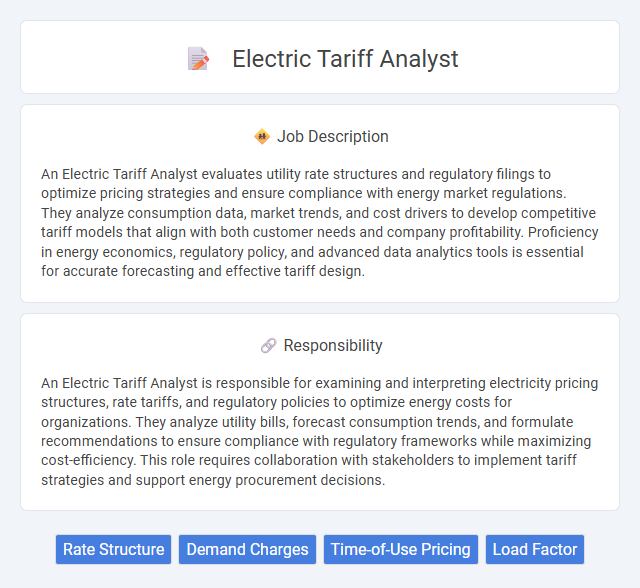
An Electric Tariff Analyst evaluates utility rate structures and regulatory filings to optimize pricing strategies and ensure compliance with energy market regulations. They analyze consumption data, market trends, and cost drivers to develop competitive tariff models that align with both customer needs and company profitability. Proficiency in energy economics, regulatory policy, and advanced data analytics tools is essential for accurate forecasting and effective tariff design.
Individuals with strong analytical skills and a keen interest in energy markets are likely to thrive as electric tariff analysts. Those comfortable working with complex data sets and regulatory frameworks may find this role suitable for their capabilities. People who prefer dynamic problem-solving over routine tasks probably have a better chance of success in this field.
Qualification
Electric tariff analysts require a strong background in energy economics, regulatory policies, and utility rate structures, often supported by a bachelor's degree in finance, engineering, or environmental science. Proficiency in data analysis tools, such as Excel, Python, or specialized tariff modeling software, is essential for evaluating pricing strategies and forecasting market impacts. Advanced knowledge of state and federal energy regulations enhances the ability to navigate complex tariff frameworks and optimize cost-effectiveness for clients or utility companies.
Responsibility
An Electric Tariff Analyst is responsible for examining and interpreting electricity pricing structures, rate tariffs, and regulatory policies to optimize energy costs for organizations. They analyze utility bills, forecast consumption trends, and formulate recommendations to ensure compliance with regulatory frameworks while maximizing cost-efficiency. This role requires collaboration with stakeholders to implement tariff strategies and support energy procurement decisions.
Benefit
An electric tariff analyst role likely offers significant benefits such as improved understanding of energy market pricing structures and the ability to optimize utility costs for clients. Professionals in this position probably gain insights that enhance strategic decision-making and contribute to cost savings. This job may also provide opportunities for career growth within the energy sector due to its specialized knowledge requirements.
Challenge
Electric tariff analyst roles likely involve complex regulatory environments requiring constant adaptation to evolving policies and market conditions. The challenge may lie in accurately forecasting costs and rates while balancing stakeholder interests and ensuring compliance. Proficiency in data analysis and a deep understanding of energy markets could be crucial to managing these demanding responsibilities effectively.
Career Advancement
An Electric Tariff Analyst specializes in evaluating and optimizing utility rate structures, ensuring regulatory compliance and cost-efficiency for energy providers. Mastery in data analysis, regulatory frameworks, and forecasting tools can lead to career advancement into senior analyst positions or managerial roles within energy consulting firms or utility companies. Progression often includes opportunities to influence energy policy, participate in strategic planning, and lead cross-functional projects that drive innovation in tariff design.
Key Terms
Rate Structure
Electric tariff analysts specialize in evaluating and designing rate structures to optimize energy pricing models for utilities and consumers. They analyze consumption patterns, regulatory policies, and production costs to develop tariffs that balance affordability, revenue sufficiency, and energy efficiency incentives. Expert knowledge of time-of-use rates, demand charges, and tiered pricing enables analysts to recommend rate designs that promote sustainable energy usage and ensure regulatory compliance.
Demand Charges
An Electric Tariff Analyst specializing in Demand Charges evaluates utility billing structures to optimize energy usage costs for commercial and industrial clients. This role involves analyzing peak demand patterns, interpreting tariff schedules, and recommending strategies to reduce demand charges, which can constitute a significant portion of monthly electricity bills. Mastery of load management techniques and utility rate design is crucial for minimizing demand charge expenditures and enhancing overall energy cost efficiency.
Time-of-Use Pricing
Electric tariff analysts specializing in Time-of-Use (TOU) pricing evaluate consumption patterns to design rate structures that incentivize energy use during off-peak hours. They analyze detailed load data, market trends, and regulatory policies to optimize tariff models that balance grid demand and customer savings. Expertise in advanced metering infrastructure (AMI) and data analytics tools is essential for developing accurate and effective TOU pricing strategies.
Load Factor
An Electric Tariff Analyst evaluates energy consumption patterns to optimize load factor, which measures the efficiency of electricity usage over time. Improving load factor reduces peak demand charges, leading to more cost-effective tariff structures and energy procurement strategies. Expertise in load forecasting, rate design, and utility regulations enables the analyst to provide actionable insights for minimizing operational expenses and enhancing grid reliability.
 kuljobs.com
kuljobs.com